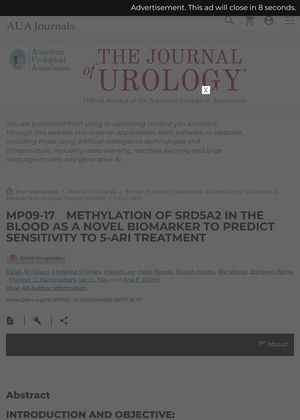Methylation of SRD5A2 in the Blood as a Novel Biomarker to Predict Sensitivity to 5-ARI Treatment
April 2024
in “
The Journal of urology/The journal of urology
”

TLDR SRD5A2 methylation in blood can predict how well someone will respond to finasteride treatment.
This study investigates the potential of using SRD5A2 methylation as a biomarker to predict the response to finasteride treatment in men with benign prostatic hyperplasia (BPH). The research involved 83 patients from the MTOPS trial and 11 participants from a clinical trial at the authors' institution. Results showed that good responders to finasteride had higher SRD5A2 protein expression, while poor responders had lower expression. Additionally, SRD5A2 protein expression was negatively correlated with prostate tissue methylation and positively correlated with peripheral WBC methylation and ferumoxytol uptake on MRI. These findings suggest that assessing SRD5A2 methylation in peripheral WBCs or using ferumoxytol-enhanced MRI could serve as non-invasive methods to predict finasteride treatment response.


